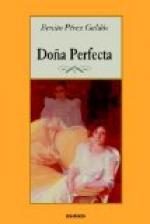=167= 5 =Briador=: in the old French poems (Chanson de Roland, etc.) Roland’s horse is called Veillantif; but the Italian poets Boiardo (in the Orlando Innamorato) and Ariosto (in the Orlando Furioso) call him Brigliadoro (= briglia d’oro, ’bridle of gold’). Pulci, however, in the Mergante Maggiore, but slightly modifies the French name, making it Vegliantin. The Spanish =Briador= is a corruption of Brigliadoro.
=167= 7 =Durlindana=: the name of Roland’s sword. In the French poems the word is Durendal. We have here again the Italianized form.
=167= 9 =entena=: the yard of a lateen sail, much longer and consequently also stouter than the yard (=verga=) of a square-rigged ship.
=167= 18 =como D. Renialdos=: in the ballad it is Roldan, not Renialdos, that pronounces the following lines. None the less, the readiness of the peasant to go on with the quotation is very true to life. The average Spaniard of the lower classes is perfectly familiar with large numbers of these old popular poems.
=167= 20 =ser bien librado=: in the sense of the intransitive =librar=.
=168= 4 =Vaya=: R. 1429; K. 659,_a_; C. 237, 6.—=unos=: cf. n. on p. 46, l. 3.
=169= 1 =Valgame=, etc.: cf. R. 1427; K. 658,_d_; C. 237, 1; and p. 62, l. 27.
=169= 12 =que decia=: ‘saying’; lit. probably ‘who’ rather than ‘which.’
=169= 13 =Ya parecio=: after =ya= the past absolute is commonly used where ordinary tense usage would require the perfect. The suddenness or completeness of a past action is thus emphasized. Cf. n. on p. 40, l. 1.
=169= 23 =esa=: R. 442; K. 265; C. 162, 2.
=170= 9 =dice=: the tense of this, as of several other verbs in the paragraph, is present, after the manner of legal depositions.




